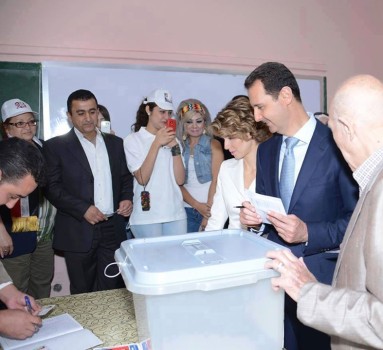The political week in Syria was dominated by the regime’s promotion of President Assad’s nominal re-election.
Assad officially received 88.7% of the vote — more than 11.3 million ballots — against two token challengers. More important for the regime’s promotion abroad was its proclamation of a turnout of almost 75% of registered voters, despite Syria’s 39-month conflict.
The regime’s PR campaign — with an emphasis on Homs, where the last insurgents evacuated last month after more than two year in the city — assembly of observers, and supervision of foreign journalists had some success. For example, the Associated Press declared on the basis of a controlled visit to a Damascus polling station, “Syria’s Election Shows Depth of Support for Assad“.
Unsurprisingly, the opposition dismissed the claims, declaring the election a “farce”.
Assad’s declaration of victory was not as straightforward on the military front last week. Syrian forces continued to struggle in their months-long attempt to take Mleha, a key town east of Damascus, and to push back the insurgent advance in southern Syria with attacks on Nawa. Indeed, by the weekend, opposition fighters were threatening to take more territory with an assault on the hilltop Tel al-Jumou. The battle for Aleppo, divided since July 2012, showed little change.
In part because of the difficulties on the ground, the regime maintained its aerial bombardment of areas near Damascus, in the south, and in and near Aleppo.
Meanwhile, the “patchwork war” was further fragmented by the continuing fighting between insurgents, Kurdish militias, and the Islamic State of Iraq and as-Sham in eastern Syria, with all sides claiming victories.
FORECAST
The re-election show has been a boost for the Assad regime, both with its base of support inside Syria and with those foreign outlets accepting the narrative of the President’s “victory” in the conflict as well as the election.
How long and how widespread that victory will be depends on the battlefield, however. Insurgents continue both to hold out against regime offensives, such as the attacks on East Ghouta near Damascus, and to make their own gains.
The Assad regime’s strategy is to try and isolate those opposition fighters by chipping away at foreign support as “illegitimate”. This week’s effort will feature an attempt by its ally Iran to persuade Turkey to distance itself from the insurgency.
Still, despite the difficulties in unifying an insurgent and opposition leadership, Gulf States such as Saudi Arabia and Qatar do not appear to be reducing their support. The US continues to be indecisive as it says it is looking to back a “moderate” challenge to President Assad.
FEATURED ANALYSES
The Real Meaning of the Election
FEATURED 1ST-HAND
“More Than 200,000 Detained” Since March 2011
Op-Ed: This Election is a Cruel Farce

